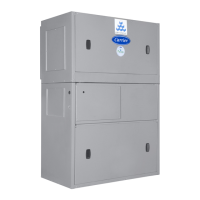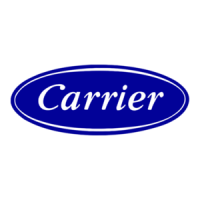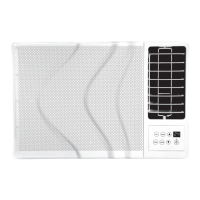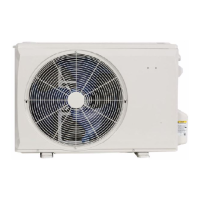2
Fan Modes . . . . . . . . . . . . . . . . . . . . . . . . . . . . . . . . . 43
• START/STOP FANS
• VARIABLE FREQUENCY DRIVE (VFD) FAN
• SUPPLY AND RETURN FAN OPERATION
• FAN OPERATION DURING DISCHARGE (SUPPLY AIR
TEMPERATURE) AIR CONTROL (DAC)
• VFD CONTROL
• FAN OPERATION DURING SMOKE EVENT
• FAN HISTORY STATISTICS
Digital Inputs for Monitoring . . . . . . . . . . . . . . . . . . 44
• FILTER STATUS (DFS)
• WATER DIFFERENTIAL PRESSURE SWITCH (DPS)
• SMOKE DETECTOR STATUS (SDS)
• COMPRESSOR STATUS
Cooling Operation . . . . . . . . . . . . . . . . . . . . . . . . . . . 44
• COOLING
• COOLING MODE
• DISCHARGE AIR CONTROL WITH MODULATING
RE-HEAT
• DISCHARGE AIR TEMPERATURE (DAT) SENSOR
• HIGH DISCHARGE AIR TEMPERATURE CONDITION
(COOLING)
• HIGH STATIC LOCK
• WATERSIDE ECONOMIZER MODE
• LEAVING WATER TEMPERATURE (LWT)
UPM Fault Monitor . . . . . . . . . . . . . . . . . . . . . . . . . . . 50
Troubleshooting . . . . . . . . . . . . . . . . . . . . . . . . . . . . 50
• COMMUNICATION LEDS
•COMPLIANCE
50BVJ and 50BVW Controls . . . . . . . . . . . . . . . . . . . 51
• HOTKEYS
• NETWORK PROTOCOL
• KEYPAD CONFIGURATION
• TUNING PARAMETERS
• MODULATING HOT GAS RE-HEAT
• CALIBRATION
• CHECKOUT/OVERRIDES
• HOME
•ALARM
• SET CURRENT TIME/DATE (24 HR CLOCK)
• UNIT OPERATION
• ARCHIVE-COMMISSIONING
• HELP
• UNIT FAN
• UNIT OPERATION SETPOINT
• SUPPLY FAN LOCKOUTS
• FAN SETPOINTS
• SMOKE DETECTOR
• STATIC PRESSURE
• RETURN DUCT STATIC PRESSURE
• RETURN FAN LOCKOUTS
• SUPPLY FAN PID TUNING PARAMETERS
• UPM FAULTS
•UPM2 FAULTS
• ALARM CONFIG
• OUTSIDE AIR RESET (TEMP RESET)
• DISCHARGE AIR
• COOLING DISCHARGE AIR CONTROL PID
• TEMPERATURE
• TEMPERATURE SETPOINT
• CONDENSER WATER VALVE
• HEATING/COOLING (HEAT/COOL)
• HEATING/COOLING SETPOINT
• SCHEDULE
• VIEW AND EDIT DAILY SCHEDULE
• WEEKLY SCHEDULE
• SAVE DAILY SCHEDULE
•USERPW
•BACNET
• SET CURRENT TIME/DATE
• DAYLIGHT SAVINGS TIME
• BACNET INSTANCE AND ID
• KEYPAD CONFIGURATION
•CO2
SERVICE . . . . . . . . . . . . . . . . . . . . . . . . . . . . . . . . . . 69
Compressor Rotation . . . . . . . . . . . . . . . . . . . . . . . 69
Fan Motor Replacement . . . . . . . . . . . . . . . . . . . . . 69
• CHECK/CHANGE VFD OUTPUT CURRENT LIMIT
MAINTENANCE . . . . . . . . . . . . . . . . . . . . . . . . . . . . . 69
Cleaning Unit Exterior . . . . . . . . . . . . . . . . . . . . . . . 69
Coil Cleaning . . . . . . . . . . . . . . . . . . . . . . . . . . . . . . 69
Inspection . . . . . . . . . . . . . . . . . . . . . . . . . . . . . . . . . 69
Air Filters . . . . . . . . . . . . . . . . . . . . . . . . . . . . . . . . . 69
Condensate Drains . . . . . . . . . . . . . . . . . . . . . . . . . 70
Water-Cooled Condensers . . . . . . . . . . . . . . . . . . . 70
• GRAVITY FLOW METHOD (FIG. 85)
• FORCED CIRCULATION METHOD (FIG. 86)
Fan Motor Lubrication . . . . . . . . . . . . . . . . . . . . . . . 70
Fan Bearing Lubrication . . . . . . . . . . . . . . . . . . . . . 71
Fan Sheaves . . . . . . . . . . . . . . . . . . . . . . . . . . . . . . . 71
•ALIGNMENT
Evaporator Fan Performance Adjustment . . . . . . . 71
• BELT TENSION ADJUSTMENT
Compressor Oil . . . . . . . . . . . . . . . . . . . . . . . . . . . . 72
TROUBLESHOOTING . . . . . . . . . . . . . . . . . . . . . . . . 72
SCHEMATICS . . . . . . . . . . . . . . . . . . . . . . . . . . . . . . 74
SENSORS AND INTEGRATION POINTS . . . . . . . . . 80
START-UP CHECKLIST . . . . . . . . . . . . . . . . . . . . CL-1
SAFETY CONSIDERATIONS
Installation and servicing of air-conditioning equipment can be
hazardous due to system pressure and electrical components. Only
trained and qualified service personnel should install, repair, or
service air-conditioning equipment.
Untrained personnel can perform basic maintenance functions of
cleaning coils and filters and replacing filters. All other operations
should be performed by trained service personnel. When working
on air-conditioning equipment, observe precautions in the
literature, tags and labels attached to the unit, and other safety
precautions that may apply.
Follow all safety codes, including ANSI (American National
Standards Institute) Z223.1. Wear safety glasses and work gloves.
Use quenching cloth for unbrazing operations. Have fire
extinguisher available for all brazing operations.
It is important to recognize safety information. This is the safety-
alert symbol . When you see this symbol on the unit and in
instructions or manuals, be alert to the potential for personal
injury.
Understand the signal words DANGER, WARNING, CAUTION,
and NOTE. These words are used with the safety-alert symbol.
DANGER identifies the most serious hazards which will result in
severe personal injury or death. WARNING signifies hazards
which could result in personal injury or death. CAUTION is used
to identify unsafe practices, which may result in minor personal
injury or product and property damage. NOTE is used to highlight
suggestions which will result in enhanced installation, reliability,
or operation.
Improper installation, adjustment, alteration, service, mainte-
nance, or use can cause explosion, fire, electrical shock or other
conditions which may cause personal injury or property damage.
Consult a qualified installer, service agency, or your distributor or
branch for information or assistance with the equipment.
The qualified installer or service provider must use factory-autho-
rized kits, parts, or accessories when servicing or repairing this
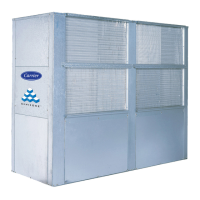
